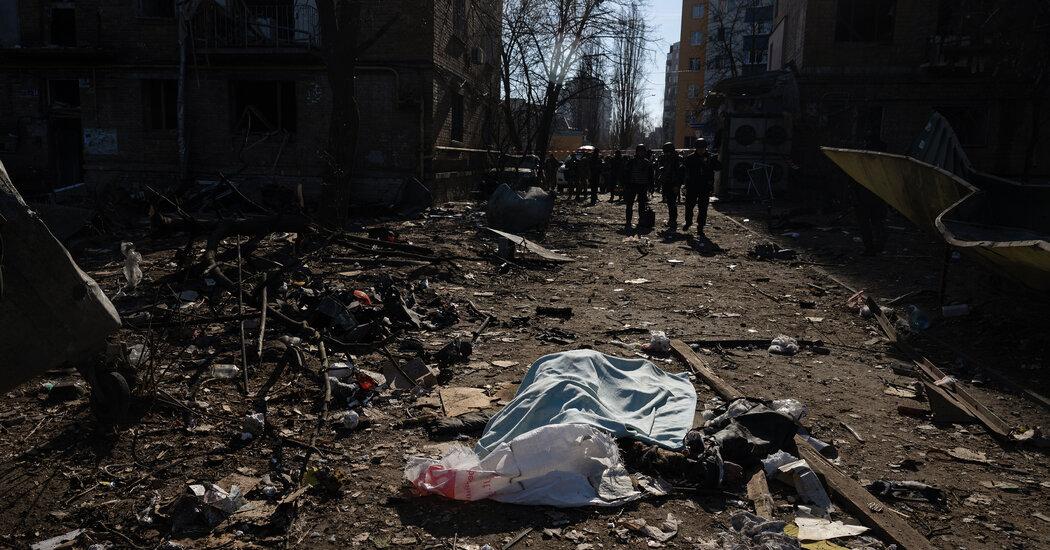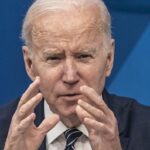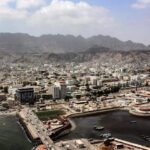
Russian forces extended their bombardments into a relatively unscathed part of western Ukraine on Friday, striking a warplane repair plant about 50 miles from the Polish border, as President Biden warned President Xi Jinping of China not to provide military aid to Russia amid a scramble of diplomatic efforts to end the violence engulfing Ukraine.
During a nearly two-hour video call, Mr. Biden warned Mr. Xi, a close ally of President Vladimir V. Putin of Russia, that there would be “implications and consequences if China provides material support to Russia as it conducts brutal attacks against Ukrainian cities and civilians,” according to the White House.
But a senior administration official declined to discuss what kind of penalties the United States would impose on China if it provided Moscow with military hardware or offered it financial relief. The official also declined to say how Mr. Xi responded to Mr. Biden’s warning.
“We will continue to watch until we see what actions they take or don’t,” Jen Psaki, the White House press secretary, said.
As Russian forces pounded cities and towns across Ukraine, France’s president, Emmanuel Macron, and Germany’s chancellor, Olaf Scholz, spoke to Mr. Putin, urging him to end the fighting.
But the calls appeared to yield few, if any, results. Speaking to Mr. Scholz, Mr. Putin complained that in intermittent talks between Russia and Ukraine, Kyiv was trying to “drag the negotiations by making a series of new, unrealistic proposals,” according to the Kremlin.
As the diplomatic efforts ground on, Russia broadened its attacks on Ukrainian targets.
A Russian missile strike about four miles from the western city of Lviv destroyed several buildings that were used to repair aircraft, shattering the relative calm in that city, a haven for civilians fleeing the heavy fighting that has engulfed the south and east and that is now gripping Kyiv and its suburbs.
The Lviv strike appeared to be an attempt to weaken the Ukrainian military’s air defenses. According to a local news article in January, the plant had been the only facility in the country that repaired MiG-29 fighter jets for Ukraine’s air force.
Lviv’s mayor, Andriy Sadovy, said that work had already stopped at the plant and that no casualties had been reported.
The Lviv strike was the latest attack on targets in western Ukraine, near the Polish border. On Sunday, a Russian airstrike hit a military base 11 miles from the border with Poland, where NATO forces are stationed on high alert.
Russia’s recent territorial gains have been mostly in the south and east, including areas around the devastated port city of Mariupol, according to Western governments and independent analysts. But Russian forces have also advanced from the southern city of Kherson, which they have captured, toward Kryvyi Rih, closer to the center of Ukraine.
Russia’s Defense Ministry said that its troops and Russia-backed separatists were “tightening the noose” around Mariupol, where residents have been preparing mass graves. The Ukrainian General Staff reported that Russians were carrying out the “total destruction of civilian infrastructure, housing and livelihoods” in the city.
In the capital, Kyiv, a large explosion from what appeared to be a cruise missile or aerial bombardment blew a crater into the courtyard of a residential building on Friday, in one of the largest strikes to hit a civilian area in the city. At least one person was killed.
But some of the war’s most intensive fighting was taking place in the suburbs outside the city, particularly in Irpin, where Russian and Ukrainian armies are stuck in a savage contest at a gateway to the capital.
In the besieged city of Mariupol, officials reported that at least 130 people had been rescued from the rubble of a theater destroyed by a missile strike Wednesday, but that hundreds — and perhaps as many 1,300 — were still missing.
The attack on the Drama Theater has become a potent symbol of Moscow’s willingness to indiscriminately target civilians; satellite images showed that the word “children” had been written in large white letters in Russian in front of the building and behind it.
“Despite the shelling, despite all the difficulties, we will continue rescue work,” President Volodymyr Zelensky of Ukraine said in a video address Friday.
Mr. Zelensky released his speech just before Mr. Putin made his first public appearance since ordering the invasion last month, addressing tens of thousands of cheering, flag-waving Russians at Moscow’s largest stadium.
Mr. Putin, who was officially marking the eighth anniversary of Russia’s annexation of Crimea, turned the event into a theatrical display of support for the invasion of Ukraine, telling the crowd that Russians “have not had such unity for a long time.”
The Luzhniki stadium was covered with posters that read “For a world without Nazism,” a reference to one of the Kremlin’s stated reasons for the invasion, to “denazify” Ukraine.
Mr. Putin’s proclamation of national unity has been undercut by the Kremlin’s increasingly fierce crackdown on dissent and the media. Earlier this month, Mr. Putin effectively criminalized public opposition and independent news reporting about the war. More than 14,900 people have been detained at antiwar rallies, according to OVD Info, a rights group that tracks arrests in Russia.
Russia-Ukraine War: Key Things to Know
The Biden-Xi talk. In a two-hour call with China’s president, Xi Jinping, President Biden discussed the Russian invasion of Ukraine, detailing the implications and consequences if Beijing were to provide material support to Russia in its attacks.
In Ukraine, the death toll and suffering from the war has been worsening as Russia, struggling to capture more territory, has stepped up its bombing of heavily populated areas, striking schools, hospitals and apartment buildings.
Hundreds of thousands of Ukrainians have lost access to food, water and heat, and at least 726 civilians, including 52 children, have been killed, according to the United Nations. More than 3.2 million people have fled the country.
Highlighting Russia’s troubles on the battlefield, the British defense intelligence service said on Friday that Russian forces “made minimal progress this week,” and Ukrainian troops around Kyiv had continued to frustrate attempts to encircle the city.
As the war drags on, there is increasing concern of its impact rippling across the globe by causing a global energy crisis and hunger worldwide with the loss of Ukrainian grain exports.
Ukraine’s food supply chain is “falling apart” amid the Russian invasion, and the disruption of food supplies within the country is threatening crucial exports of grain that could undermine global food security, the United Nations said on Friday.
“The consequences of this conflict in Ukraine are radiating outwards, triggering a wave of collateral hunger across the globe,” Jakob Kern, operations director of the World Food Program, told reporters. “Ukraine is a catastrophe compounding what is already a year of catastrophic hunger.”
Russia and Ukraine account for nearly 30 percent of the world’s wheat trade, Mr. Kern said, and the interruption of those exports is driving up prices beyond the reach of millions of poor people.
The International Energy Agency, which was formed in the wake of the 1973 oil crisis to ensure a stable worldwide energy market, said that the repercussions of the invasion on energy supplies were likely to intensify over the next several months as the summer driving season gets underway.
Despite the shocks to the world economy, the efforts to find a negotiated solution to the conflict were still bearing little fruit. As Mr. Putin sought to rally domestic support for the invasion, Western officials said they saw little reason to hope that negotiations between Russian and Ukraine had reached a serious stage — or even confronted the most difficult issues at stake.
Mr. Zelensky has seemed in recent days to signal that his country will not join NATO, which would satisfy a key Russian demand. But Ukraine says any form of neutrality must come with security guarantees against further Russian aggression.
Moscow has also demanded that Ukraine accept the loss of Crimea, annexed by Russia in 2014, and accept that the entire regions of Donetsk and Luhansk, and not just the areas now occupied by Russian-backed separatists, become independent republics, as Mr. Putin has decreed.
Michael Levenson reported from New York, Megan Specia from Warsaw and Edward Wong from Washington. Reporting was contributed by David E. Sanger from Washington; Farnaz Fassihi from New York; Carlotta Gall from Kyiv, Ukraine; Valerie Hopkins from Lviv, Ukraine; Steven Erlanger from Brussels; Ivan Nechepurenko; Patrick Kingsley from Tbilisi, Georgia; and Amy Qin from Taipei, Taiwan.




